| |||||
| Decades: | |||||
|---|---|---|---|---|---|
| See also: | |||||
The following lists events that happened during 2002 in Ivory Coast .
| |||||
| Decades: | |||||
|---|---|---|---|---|---|
| See also: | |||||
The following lists events that happened during 2002 in Ivory Coast .

The politics of Ivory Coast takes place in a framework of a presidential representative democratic republic, whereby the President of Ivory Coast is both head of state and head of government, and of a multi-party system. Executive power is exercised by the President and the Government. Legislative power is vested in both the government and parliament.
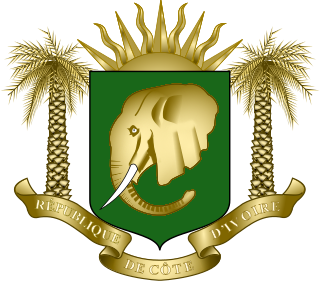
The Armed Forces of Côte d'Ivoire are the armed forces of Ivory Coast.
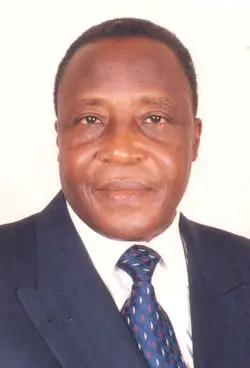
Robert Guéï was an Ivorian politician who was the military ruler from 24 December 1999 to 26 October 2000. He succeeded President Henri Konan Bédié after the 1999 Ivorian coup d'état and lost to Laurent Gbagbo in the ensuing 2000 Ivorian presidential election. Guéï, his wife Rose Doudou Guéï, and his children were killed on 19 September 2002 on the first day of the First Ivorian Civil War.

Koudou Laurent Gbagbo is an Ivorian politician who was the president of Côte d'Ivoire from 2000 until his arrest in April 2011. A historian, Gbagbo was imprisoned in the early 1970s and again in the early 1990s, and he lived in exile in France during much of the 1980s as a result of his union activism. Gbagbo founded the Ivorian Popular Front (FPI) in 1982 and ran unsuccessfully for president against Félix Houphouët-Boigny at the start of multi-party politics in 1990. He won a seat in the National Assembly of Côte d'Ivoire in 1990.

Aimé Henri Konan Bédié was an Ivorian politician. He was President of Côte d'Ivoire from 1993 to 1999, and formerly President of the Democratic Party of Ivory Coast – African Democratic Rally (PDCI-RDA). Prior to becoming president, he was a member and president of the National Assembly of Ivory Coast. He unsuccessfully sought another term as president in the 2020 presidential election.
Seydou Elimane Diarra was an Ivorian politician, who served as the Prime Minister in 2000 and again from 2003 to 2005.

Korhogo is a city in northern Ivory Coast. It is the seat of both Savanes District and Poro Region. It is also a commune and the seat of and a sub-prefecture of Korhogo Department. In the 2014 census, the city had a population of 243,048, making it the fourth-largest city in the country and the largest in northern Ivory Coast.
The First Ivorian Civil War was a civil conflict in the Ivory Coast that began with a military rebellion on 19 September 2002 and ended with a peace agreement on 4 March 2007. The conflict pitted the government of Ivorian President Laurent Gbagbo against a domestic insurgency led by the New Forces of Ivory Coast. Following the war, a second civil war (2010–2011) would begin over the results of the 2010 Ivorian presidential election.

Ibrahim Coulibaly was a military and rebel leader in Côte d'Ivoire. A Staff Sergeant in the Armed Forces of Côte d'Ivoire, Coulibaly had served since at least the early 1990s. As Côte d'Ivoire slid into communal conflict, Coulibaly joined the 1999 coup led by Robert Guéï. A second coup, following 2000 elections that made Laurent Gbagbo President, saw Coulibaly in a leadership position, after which he came into conflict with fellow military leader Guillaume Soro. During the ensuing eight years of division in the country, Coulibaly came into conflict with both sides, eventually returning to lead an Abidjan-based militia supportive of Alassane Ouattara. Following the end of fighting, Coulibaly was killed in Abidjan by Ouattara's forces during an attempt to disarm his group. Known popularly as "IB", he was 47 years old at the time of his death.
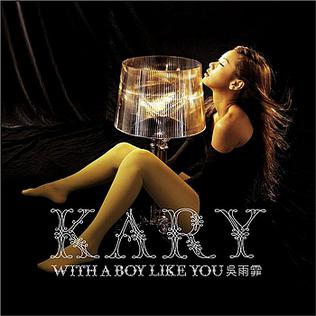
With a Boy Like U is the official title of the debut solo album by Kary Ng, released on January 31, 2006. It is more commonly known among English speakers as With a Boy Like You.
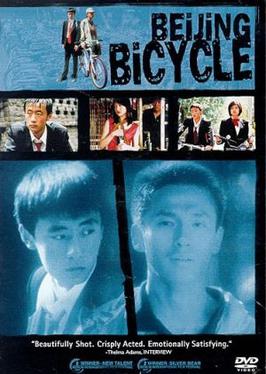
Beijing Bicycle is a 2001 Chinese drama film by Sixth Generation Chinese director Wang Xiaoshuai, with joint investment from the Taiwanese Arc Light Films and the French Pyramide Productions. The film stars first-time actors Cui Lin and Li Bin, supported by the already established actresses Zhou Xun and Gao Yuanyuan. It premiered at the 51st Berlin International Film Festival on 17 February 2001 and won the Jury Grand Prix, but was subsequently banned in Mainland China. The ban was eventually lifted in 2004.
Marc-Éric Gueï is an Ivorian former professional footballer who played as a striker. He mostly played for French and Greek clubs.

Presidential elections were held in Ivory Coast on 22 October 2000. Robert Guéï, who headed a transitional military regime following the December 1999 coup d'état, stood as a candidate in the election. All of the major opposition candidates except for Laurent Gbagbo of the Ivorian Popular Front (FPI) were barred from standing. The Rally of the Republicans (RDR) and Democratic Party of Côte d'Ivoire – African Democratic Rally (PDCI-RCA) boycotted the election in response to the exclusion of their candidates by the Supreme Court.

The 1999 Ivorian coup d'état took place on 24 December 1999. It was the first coup d'état since the independence of Ivory Coast and led to the President Henri Konan Bédié being deposed.
Operation Autumn Return was a non-combatant evacuation operation of the United States armed forces conducted from September 22 to October 4, 2002, in Côte d'Ivoire.
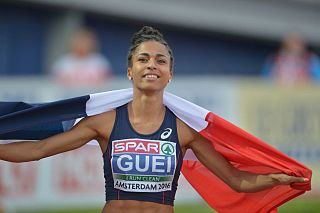
Floria Gueï is a French sprint athlete of Ivorian origin specialising in the 400 metres. A 2016 European Championships silver medallist and a 2017 European Indoor Championships gold medallist, she also won as a member of women's 4x400 m relays a bronze at the 2013 World Championships and medals at several other international competitions.
Rose Doudou Guéï was wife of the Head of State of Cote d'Ivoire, Robert Guéï, and consequently First Lady of Ivory Coast from 1999 to 2000.

Tuo Fozié is an Ivorian military officer and politician. Since 2012, he has been the prefect of both Bounkani Region and Bouna Department in north-eastern Ivory Coast.
This period in the history of Ivory Coast was affected by the end of the 33-year reign of Félix Houphouët-Boigny in 1993, as well as demographic change which had seen the Muslim population rise from 6% in 1922 to 38.6% in 1998, including a majority in the north of the country.
The 2002 Ivorian coup attempt was a failed coup d'état in the Ivory Coast against Laurent Gbagbo's government by dissident factions within the Ivorian military that plunged the country into a multiyear-long civil war which tore it into two: the rebel-held North and the government-controlled South. Motives for the coup attempt include frustrations regarding the demobilizing of soldiers instated during General Robert Guei's rule and known for their loyalty towards him. While many of them left as ordered, they refused to hand in their weapons, apparently stashing them for the upcoming coup attempt.